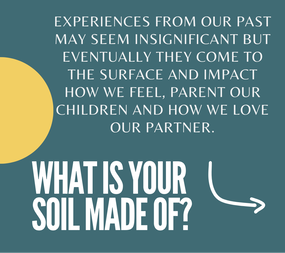 By Amanda Craig PhD, LMFT Family Therapist Author of the recently released book: Who Are You and What Have You Done With My Kid: Connect With Your Tween While They Are Still Listening Working as a marriage and family therapist, one of the great joys of my work is helping couples and families feel more connected, and for the individual family members to heal hurt parts of them that lead to feeling more alive and responsive in relationships. One of the questions I get asked regularly is, “how come I know the right answers yet I still don’t do the right thing in the moment”? Well, there is a very simple answer to that question which leads to a very complex life journey. Experiences from our past may seem insignificant but eventually they come to the surface and impact how we feel, parent our children and how we love our partner. In my book, Who Are You and What Have You Done With My Kid: Connecting While They Are Still Listening, I make this analogy: It’s like this: you move into a house; perhaps you’ve even built it yourself. It sits on a piece of land. The view is great. What a future you see! The thing is, we sometimes get so caught up in the view we forget to look at the ground beneath us- The soil on which our house sits. Perhaps there are contamination or water issues, or rocky bedrock causing uneven ground. If so, our house will have problems. So we have three choices: ignore the problem and hope for the best (denial), move (denial, denial), or remediate the soil to create a solid base and a way forward. You see, our history doesn’t stay in the past it may lay dormant and seem unimportant for years. Until we have families of our own. And then the soil on which we are building our family is revealed in our feelings and behaviors towards our partner and our kids. It could be growing up with parents where we experienced feelings of judgment regularly or never being good enough, perhaps living with parents who had untreated addiction and mental illness which left us feeling neglected, abandoned or fearful. In addition, our soil issues can form from experiences of academic disabilities that went undetected, struggles with being bullied, or peer conflicts that left us feeling scared or alone. Maybe a painful romantic relationship that left us feeling abandoned or small. This isn’t an exhausted list but common experiences I see in my practice that stunt our ability to be healthy ourselves while raising a family.  By Amanda Craig PhD, LMFT Could the holiday season get more stressed? With holiday decorations now showing up before Halloween, the social media-induced pressure to produce Insta-worthy activities, the shopping, the parties (just you wait: they’re coming. Lots of pent up COVID demand there) and the card …oy, the card. Then there’s our tween, at the crazy-making crossroads between no-longer-a-little-kid but not-yet-a-teen. Sure, ‘tis the season of joy, sugar plum fairies, the eight days of Hanukkah and all that, and these are absolutely first world problems. But. While I don’t deny the good stuff, there are truths about the holidays people don’t usually talk about—the kind that put our holiday train through unexpected turns, hills and awkward, unwanted lulls as we careen on an exhausting ride to January 1. There are also things we can do about them. So, if we really want to arrive at a Happy New Year, let’s start by looking at these truths and the ways to counteract them.
The problems we have in family relationships throughout the year are often magnified during the holidays. Those who drink tend to drink more. If we argue, we’ll argue more. Financial stress becomes bigger financial stress. And so on.
As the pace intensifies and we’re out more, we pay a price with more stress and hits to our physical and mental health …social exhaustion is a thing…and the wheels come off the rails.
Will our tween join the family fun or keep to themselves? Will they be enthusiastic about the long-standing family traditions or shrug them off? Will they embarrass us with bad behavior in front of the extended family or show up cheerfully? Worry too much …and the wheels come off the rails. Here are five easy tips to keep the holiday train on track. 1. Give your undivided attention. Now. Not when everything is done. Stop multitasking. Make eye contact. Be fully present with your kids and your partner. Give them the experience of being your sole focus, your only care. It matters. It allows our children to feel seen. It shows our partner we care about them. It strengthens our emotional connection and nourishes our relationships. Five minutes of undivided attention nourishes us more than three hours together multitasking. 2. Listen and share. Talk with curiosity and wonder. Ask:
|
Categories
All
Archives
March 2023
|
[email protected]

 RSS Feed
RSS Feed